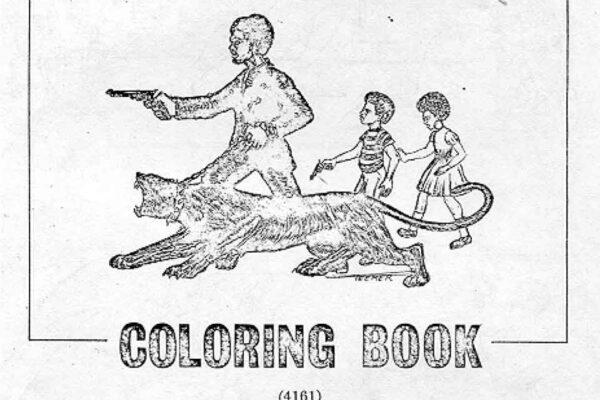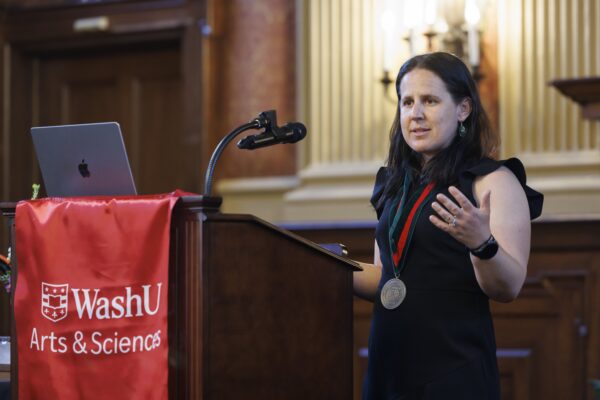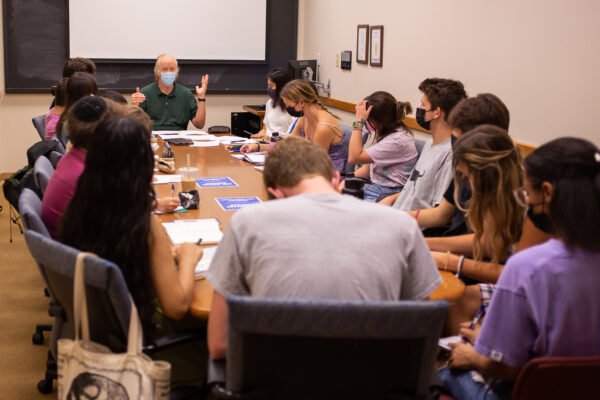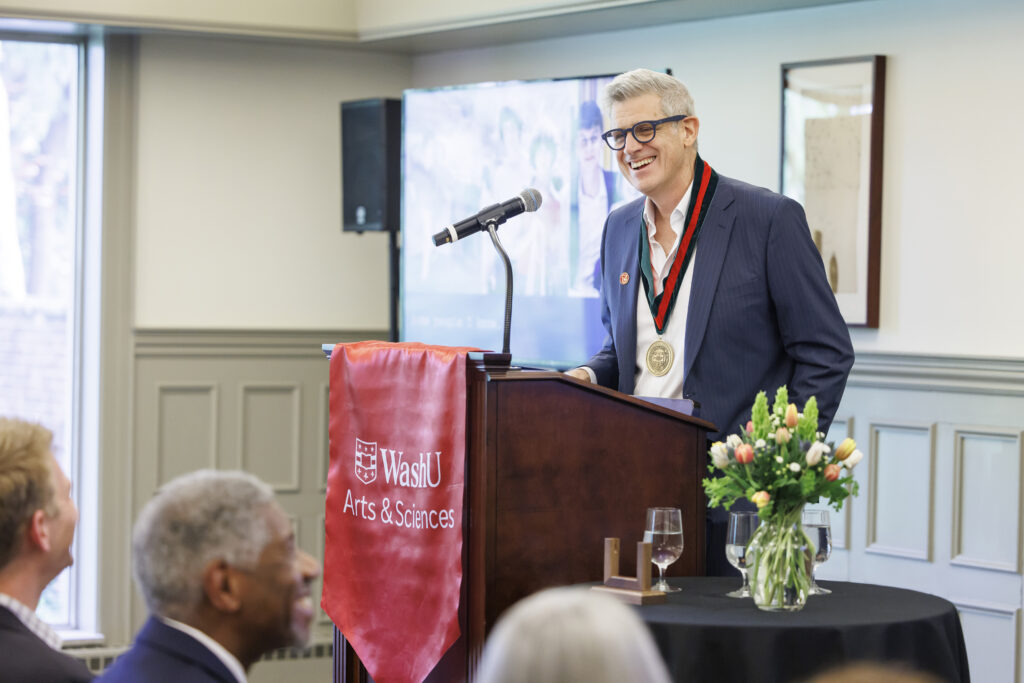
William J. Maxwell has been installed as the inaugural Fannie Hurst Professor of Creative Literature in Arts & Sciences at Washington University in St. Louis. A lecture and reception to celebrate his appointment took place April 24 in Whittemore House.
Maxwell, who joined the WashU faculty in 2009, teaches in the departments of English and of African and African American Studies. His research and scholarship explore modern American and African American literature and its ties to U.S. political history.
“Bill Maxwell is a consummate scholar, a gifted literary historian and steadfast university citizen,” Chancellor Andrew D. Martin said. “Whether tracing the impact of J. Edgar Hoover’s FBI on midcentury Black writers, recovering Claude McKay’s lost novel ‘Romance in Marseille’ or exploring James Baldwin’s 21st-century revival, Bill serves as a mentor and model to students and faculty alike.”
During the installation ceremony, Feng Sheng Hu, the Richard G. Engelsmann Dean of Arts & Sciences and the Lucille P. Markey Distinguished Professor, recognized Maxwell’s “long and distinguished academic career” as the author or editor of five books on African and African American literature and dozens of essays in academic and popular journals.
“Professorship installation ceremonies are one of my favorite traditions at WashU,” Hu added. “They bring us together to recognize the incredible work of our faculty and the generosity of those who help make it possible.”
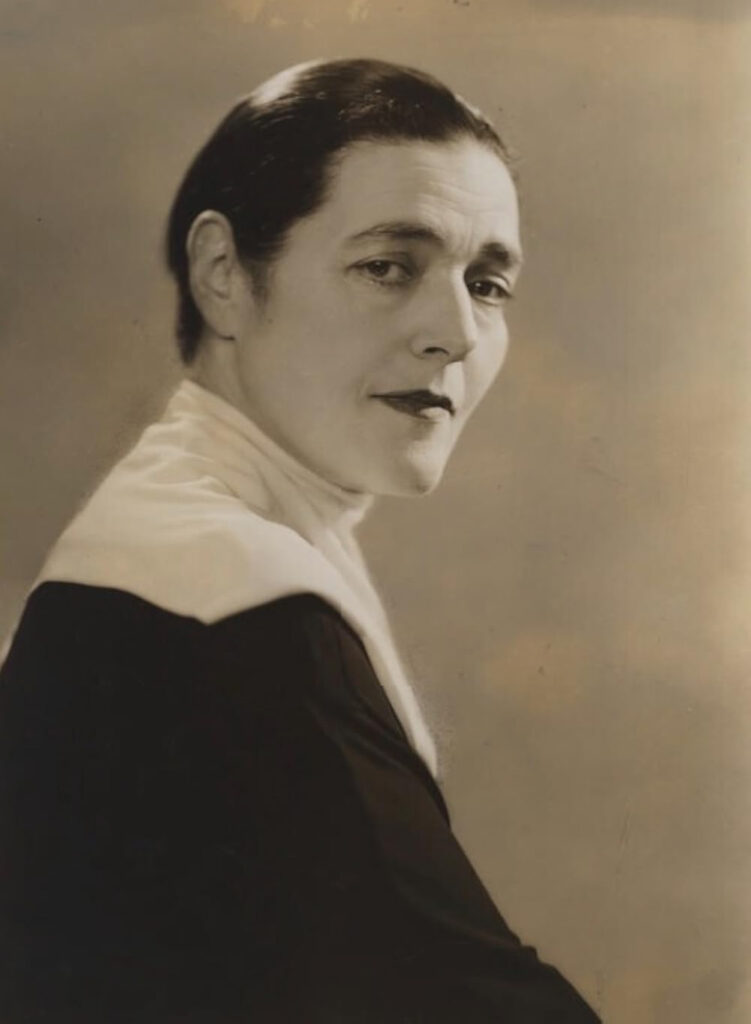
Maxwell’s installation address, “Fannie Hurst, or the Drama of the White African Americanist,” explored Hurst’s status, for much of the 20th century, as one of the “best-paid, best-publicized, most prolific, and most outspoken creative writers and liberal activists in the United States.”
Hurst is today best remembered for her 1933 novel “Imitation of Life,” conceived in part during a road trip with her friend Zora Neale Hurston. The book chronicles the relationships between a white single mother, her African American business partner, and the daughters they both neglect.
“Like Harriet Beecher Stowe’s ‘Uncle Tom’s Cabin,’ its prototype in maudlin agitation, ‘Imitation of Life’ is a galling, do-gooding paradox,” Maxwell said. At once progressive and paternalistic, Hurst’s book “generated no social cataclysms, but plenty of studio movies, popular telenovelas, postmodern drag shows, late-career REM singles, and proliferating Black parodies in all genres, caustic and absurd.”
Despite the book’s limitations, Maxwell added, “I think she knew this much: that all of us Americans are forever locked in interracial exchanges, heated and enlightened, freeing and wounding and frequently unequal, and that we and our country are the combined stuff these exchanges are made of.”
Watch the full ceremony on the Ampersand website.
About William J. Maxwell
Born in Jersey City, N.J., Maxwell earned a bachelor’s degree with honors from Columbia University in 1984. He went on to complete a master’s and a PhD in English from Duke University as an Angier B. Duke Fellow. Prior to arriving at WashU in 2009, he taught at the University of Geneva in Switzerland, the College of William and Mary, and the University of Illinois at Urbana-Champaign. He was elected president of the Modernist Studies Association in 2021 and was a visiting scholar at New York University in 2022.
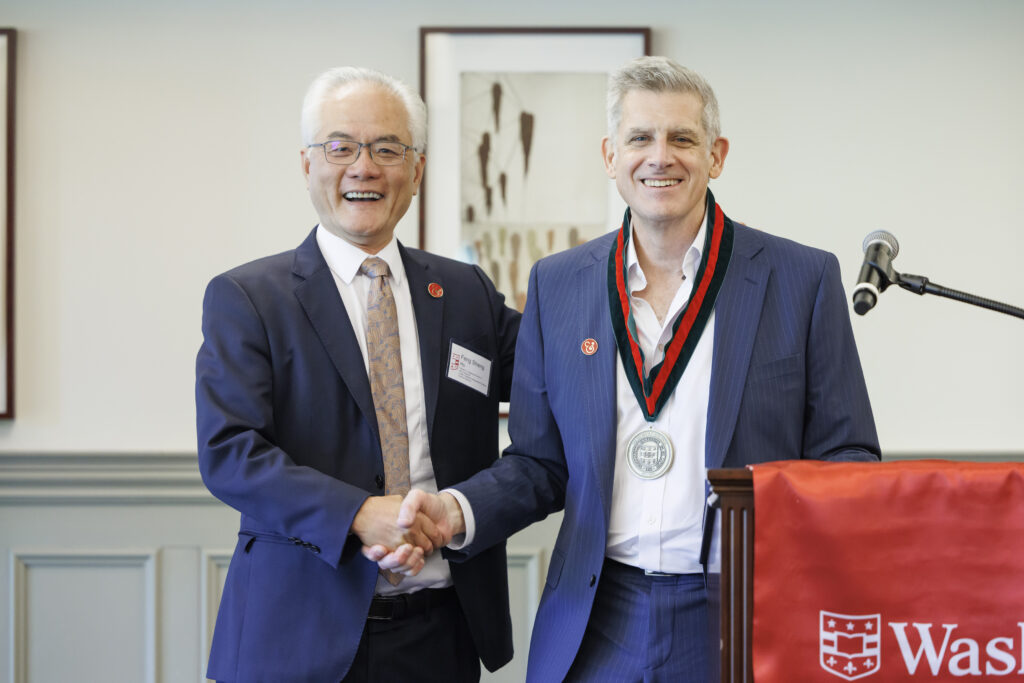
Maxwell has published five books. He is the author of “F.B. Eyes: How J. Edgar Hoover’s Ghostreaders Framed African American Literature” (2015), which won an American Book Award, and “New Negro, Old Left: African American Writing and Communism between the Wars” (1999). He edited “James Baldwin: The FBI File” (2017); Claude McKay’s “Complete Poems” (2004, 2008, 2013); and, with Gary Holcomb, McKay’s previously unpublished novel “Romance in Marseille” (2020), which became a New York Times book of the week and New York Magazine book of the year. His book-in-progress, “James Baldwinism: The Baldwin Revival and Twenty-First Century Memory,” traces how and why Baldwin became the 20th-century African American writer most cherished in the 21st century. Maxwell’s essays and reviews have appeared in academic and popular journals including The American Historical Review, Callaloo, The Common Reader, Harper’s, The Irish Times, The Journal of American History, The Los Angeles Review of Books, Politico, Publishers Weekly, Salon and the Times Literary Supplement.
At WashU, Maxwell has served as the director of both the graduate and undergraduate programs in English. He was appointed to the board of PMLA, the journal of the Modern Language Association, in 2024 and has worked widely as a scholarly editor, currently serving as a contributing editor at American Literary History and WashU’s own James Baldwin Review.
About Fannie Hurst
Born in Hamilton, Ohio, in 1885, Hurst moved to St. Louis as a young child and later attended Washington University. Her first published story, “Ain’t Life Wonderful,” appeared in the St. Louis magazine Reedy’s Mirror during her junior year. As a senior, she wrote the book and lyrics for a comic opera, “The Official Chaperon,” which was performed on campus. She graduated in 1909.
Moving to New York City to pursue a writing career, Hurst supported herself with a series of odd jobs, working as a waitress, salesperson and actor. Those experiences sparked a lasting interest in the concerns of poor and working people. In 1912, she sold her first story to the Saturday Evening Post and in 1914 released her first collection, “Just Around the Corner.”
Following World War I, Hurst emerged as one of the nation’s most popular writers, publishing 19 novels, more than 300 short stories, four plays produced on Broadway, a full-length autobiography and an autobiographical memoir, numerous magazine articles, personal essays and screenplays for several films. She also actively worked and spoke on behalf of social justice organizations and causes supporting feminism and African American civil rights.
Hurst received an honorary degree from WashU in 1953. In addition to the new professorship, WashU’s Hurst Lounge, which hosts dozens of readings each semester, and the long-running Visiting Hurst Professorship, which welcomes top writers to campus, are named in her honor. She died in 1968.
